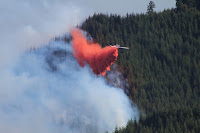The U.S. Forest Service has warned it is at the “tipping point” of a crisis in dealing with escalating wildfires and diseases that are ravaging America’s increasingly fragile forest ecosystems.
The federal agency, which manages 193 million acres of forest, will plead once again for more funding from Congress, in the wake of a devastating 2015 that saw record swaths of forest engulfed in flames.
A total of 10.1 million acres were burned last year, a figure that is double the typical losses seen 30 years ago. During this time, the average fire season in the U.S. has lengthened by 78 days, with scientists predicting that the amount of forest razed by fire will double by 2050.
Climate change-driven drought, wildfire and invasive diseases are stretching the U.S. Forest Service to breaking point, the agency has warned. It spent about 65 percent of its $5 billion budget dealing with wildfires last year and is requesting that fire be treated like other natural disasters so that it is able to access more money to keep pace.
“We are seeing real challenges on the ground – climate change is real and it is with us,” Robert Bonnie, under secretary for natural resources and environment at the U.S. Department of Agriculture, told the Guardian. “The whole U.S. Forest Service is shifting to becoming an agency dominated by wildfires. We really are at a tipping point. The current situation is not sustainable.”
...
Major wildfires are just one of several threats to the U.S.’s ailing forest system. A report released by the U.S. Forest Service last week found that worsening drought conditions will increase the risk of tree and shrub death as well as unleash outbreaks of insect infestation. More than 20 million acres of forest in the U.S. west has already been affected by bark beetles that thrive in dry, warm conditions.
“Droughts are predicted to accelerate the pace of invasion by some nonnative plant species into rangelands and grasslands,” the report states. “Drought can also promote plant invasion indirectly by modifying the environment to favor nonnative species. Indirect effects of drought on forests can be widespread and devastating.”
Read more at U.S. Forest Service Stretched After Record Wildfires Year

No comments:
Post a Comment